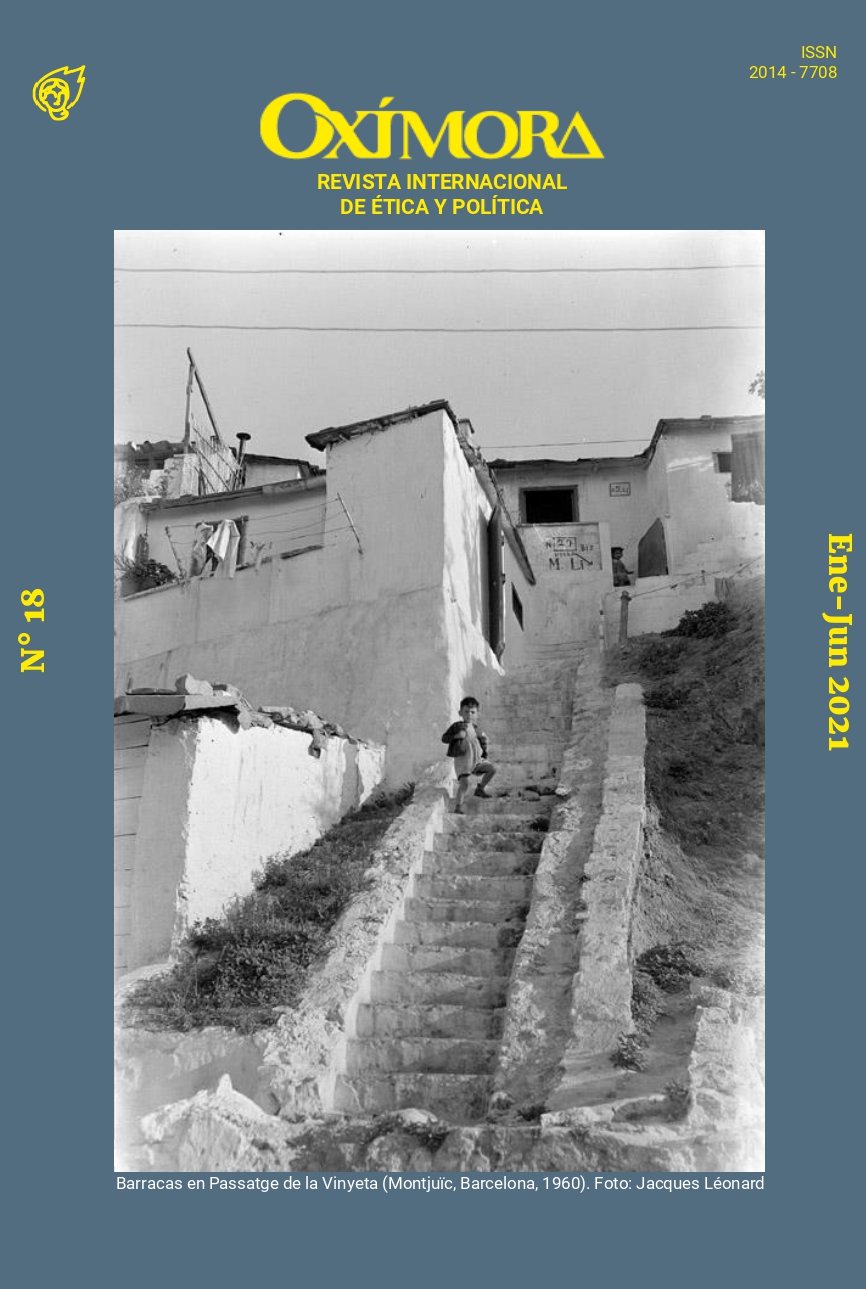Judaism and Sociopolitical Commitment in A. Heschel
DOI:
https://doi.org/10.1344/oxi.2021.i18.32736Keywords:
Ethics, Action, Service, Justice, JudaismAbstract
The present text aims to show the convergence between ethics, politics and Jewish mysticism. To do this, it starts from a set of reflections contributed by Abraham Heschel, a Polish rabbi and philosopher who lived during the 20th century. The article is divided into four parts, first addressing the ethical and political commitment that emerges from the philosophy of religion proposed by Heschel. Subsequently, it alludes to the value of action and the involvement of the religious with the social, of the mystical with the political. In a third moment, the sense of service is emphasized, understood as individual contributions for the construction of community well-being. Finally, attention is directed to Heschel´s invitation to promote justice and various aspects of his relationship with Luther King will be alluded to.
References
Al-Yahud, D. (1952). Professor Heschel, the Creative Thinker. The Jewish Forum, 35 (8), 137-141.
Barnard, D. (1985). Religion and Medicine: A Meditation on Lines by A. J. Heschel. Soundings, 68 (4), 443-465.
Bizzell, P. (2006). Rabbi Abraham Joshua Heschel: Religion and race. Voices of democracy, 1, 1-14.
Friedman, M. (1973). Abraham Heschel among Contemporary Philosophers: From Divine Pathos to Prophetic Action. Philosophy Today, 18 (4), 293-305.
Gottschalk, A. (1973). Abraham, Joshua Heschel: A Man of Dialogue. Conservative Judaism, 28 (1), 23-26.
Heschel, A. (1952). La Tierra es del Señor. Buenos Aires: Candelabro.
Heschel, A. (1962). The Prophets (2 vols.). New York: Harper and Row.
Heschel, A. (1964). La base religiosa de la igualdad de las razas. Maj´Shavot/Pensamientos, 3 (2), 33-36.
Heschel, A. (1968). Conversation with Martin Luther King. Conservative Judaism, 22 (3), 1-19.
Heschel, A. (1973). Los profetas (vol. 2: Concepciones históricas y teológicas). Buenos Aires: Paidós.
Heschel, A. (1974). “Conversación con Heschel” [Entrevista realizada por Carl Stern]. Maj’shavot/Pensamientos, 13 (1), 33-39.
Heschel, A. (1982). El hombre no está solo. Buenos Aires: Seminario Rabínico Latinoamericano.
Heschel, A. (1984a). El Shabat: su sentido para el hombre moderno. Buenos Aires: Seminario Rabínico Latinoamericano, 1984.
Heschel, A. (1984b). Dios en busca del hombre. Buenos Aires: Seminario Rabínico Latinoamericano.
Heschel, A. (1987). Democracia y otros ensayos. Buenos Aires: Seminario Rabínico Latinoamericano.
Heschel, S. (1990). Heschel as Mensch: Testimony of his Daughter. En J. Neusner y N. Neusner (Eds.) (1990). To Grow in Wisdom: An Anthology of Abraham Joshua Heschel (195-211). Lanham (Maryland): Madison Books.
Heschel, S. (1996). (ed.), Moral Grandeur and Spiritual Audacity. New York: Farrar, Straus, Giroux.
Heschel S. (1998). Theological affinities in the writings of Abraham Joshua Heschel and Martin Luther King, Jr. Conservative Judaism, 50 (2-3), 126-143.
Kaplan, E. (1987). Misticismo y desesperanza en el pensamiento religioso de A. J. Heschel. Maj’shavot/Pensamientos, 26 (12), 22-36.
Kasimow, H. (2009). Prophetic voices. Abraham Joshua Heschel’s friendship with Martin Luther King, Jr. Interreligious Insight, 7 (2), 56-64.
King, M. L. (1986). The Essential Writings and Speeches of Martin Luther King, Jr. San Francisco: Harper Collins.
Kullock, J. (2014). El D´s del Pathos en A. J. Heschel. Maj´Shavot / Pensamientos, 53 (1), 1-16.
Levenson, J. (1999). The Contradictions of A. J. Heschel. Maj’shavot / Pensamientos, 37 (1), 23-29.
Meyer, M. (1973). Prólogo. En A. Heschel, Los profetas, vol. 1 (pp. 9-15). Buenos Aires: Paidós.
Pérez, V. (2007). La religión judía desde Buber y Heschel ante la posmodernidad. Historia y Grafía, 28, 41-68.
Rothschild, F. (1976). Between God and Man: An Interpretation of Judaism from the Writings of Abraham J. Heschel. New York: The Free Press.
Stampfer, J. (1985). Prayer and Politics, the Twin Poles of Abraham Joshua Heschel. Portland: Institute of Judaic Studies.
Tanenzapf, S. (1974). Abraham Heschel and his Critics. Judaism, 23 (3), 276-286.
Downloads
Published
How to Cite
Issue
Section
License
a) Authors retain copyright and grant the journal the right of first publication.
b) Texts will be published under a Creative Commons Attribution License that allows others to share the work, provided they include an acknowledgement of the work’s authorship, its initial publication in this journal and the terms of the license.



